If you want Christ’s teaching to transform your marriage, here is something for you to consider: you may be interpreting Christ’s teachings on marriage all wrong. Especially if you’re looking towards something that establishes proper gender roles, but in a way that can bruise a wife’s body and heart rather than presenting her “unblemished.”
Fortunately, we are here to walk you through the Christian teachings that transformed our marriage from the bottom up. Literally.
You see, prior to following these teachings, our marriage was in disarray. I felt neglected by my husband, and he was frustrated because his masculine nature was not being satisfied. My husband is not just a man, he is a commander of men. He is a muscular, bronzed, calloused, high-energy male who runs his own business and simultaneously works with his hands. And yet at home, he felt that something was missing, as did I. Where we should have been hot and fiery, we were lukewarm. Where we should have been harmonious, we were contentious.
One day, my husband approached me and said “honey, there’s something I’d like to try to improve how things have been going. I have been reading in Ephesians, and I’ve got an idea.”
My husband read me several verses I knew very well from Ephesians 5: “Wives, submit yourselves unto your own husbands, as unto the Lord. For the husband is the head of the wife, even as Christ is the head of the church: and he is the savior of the body. Therefore as the church is subject unto Christ, so let the wives be to their own husbands in every thing. Husbands, love your wives, even as Christ also loved the church, and gave himself for it; That he might sanctify and cleanse it with the washing of water by the word, That he might present it to himself a glorious church, not having spot, or wrinkle, or any such thing; but that it should be holy and without blemish. So ought men to love their wives as their own bodies. He that loveth his wife loveth himself.”
My husband explained to me that he had had what he suspected might be a divine revelation about this passage. He focused in on details that I had previously ignored. “I’ve always wondered what head meant in this context, but I think it might have something to do with the slang ‘giving head,’” he said. “At first I thought, well, maybe that means she’s supposed to be giving me blow jobs. But if you read a little further, it’s obviously not talking about blow jobs. The husband is the one loving the wife in this context, and she is to submit to him as the savior of her body. He is to sanctify and cleanse her with the washing of water by the word. What does that mean? I used to think it meant husbands were supposed to read their wives words from the Bible, but that’s not very literal, is it? I think God intended for the Bible to be taken literally, especially in the King James version, and the most literal meaning of ‘washing of water by the word’ that I can think of is a good tongue-bath. The Bible is not very watery, is it? But a man’s tongue is for sure.”
My husband went on to explain that for a man to love his wife as his own body would mean he would give her everything he desired from her, and a big part of that would be oral sex.
“I think the Lord is telling me to improve our marriage by giving your lady parts a spiritual experience,” my husband concluded.
I was skeptical and a bit nervous of this. “Wouldn’t it just be easier if I baked you a pie or something?” I asked.
“Are you trying to emasculate me?” my husband asked. “Desert makes men fat, and fat produces estrogen.” He was so insistent that I soon found myself lying face-up on our bed. My husband got into position, and he told me that I should relax and focus on being healed, cleansed and sanctified by his washings of water by the word. “You have no spot or wrinkle or blemish in my sight,” he said. “I present you to myself as my glorious bride.”
I was irritated at first by his rough whiskers and the oddness of the arrangement, but then I began gradually to submit to his headship. I decided to meditate on his words and on his sanctifying love for a good half an hour, until I had the most blissful experience of my life.
This became a daily ritual, and eventually the release and the wonder I felt wrung tears from me. As a woman who had internalized various rants on modesty and purity over the years, I realized all the shame I had been carrying about my body. Truly, my husband was loving my body as he loved his own, and truly, he found me beautiful. Once I experienced this deep thing with him, our marriage began to improve almost instantly. I no longer felt neglected, and his raw masculine power had found an appropriate, Biblical outlet. He led me to heights I never knew existed.
Looking to the Bible
With the new view I had on Ephesians 5, I began to look at other verses differently as well. There was just so much in the Bible about this act!
1 Corinthians 7:3 talks about sex acts and says “Let the husband render to the wife due benevolence: and likewise also the wife to the husband.” What is more benevolent than oral sex in the marriage relationship? Pretty much nothing! After my husband showed me the glories of oral, I began to return the favor.
I particularly love Song of Solomon 4:16: “Awake, O north wind; and come, thou south; blow upon my garden, that the spices thereof may flow out. Let my beloved come into his garden, and eat his pleasant fruits.” I’m not sure how much more explicit you can get than going south to blow on someone’s garden and eat its pleasant fruits.
The question of technique may come up, and the Bible has an answer for that as well, from 1 Corinthians 13: “love is patient, love is kind.” A husband must be patient when he is washing his wife with water by the word. And he must be kind. Love, according to this passage, is not boastful, rude, selfish or jealous. In other words, a man must enact his love to his wife in a way that is not boastful, rude, selfish or jealous. He should not focus on any past thing that would make him jealous, and he should conduct himself in all humility and sweetness.
This is not to say that he may not be passionate. I have never seen anything more passionate than my husband in the depths of one of his washings. He is ecstatic to be doing it. He adores the fact that I am a woman and he adores making me feel awakened in that way. As Proverbs 5 says, “Let your fountain be blessed, and rejoice in the wife of your youth, a lovely deer, a graceful doe. Let her breasts fill you at all times with delight; be intoxicated always in her love.” I never knew what that verse really meant, or what a man in the depths of love intoxication looked like, until I saw my husband drown himself in my secret parts.
Oral sex has a strong stigma in some women’s minds because it is so severely intimate. But remember the natural order of things in the Garden of Eden, from Genesis 2:25: “And the man and his wife were both naked and were not ashamed.” There is nothing to be ashamed of when you are man and wife.
You should meditate on these precious verses and see what a difference they can make in your marriage!
“Husbands, love your wives, as Christ loved the church and gave himself up for her, that he might sanctify her, having cleansed her by the washing of water with the word, so that he might present the church to himself in splendor, without spot or wrinkle or any such thing, that she might be holy and without blemish.” [Eph 5:25-27 ESV]
I never dug into the meaning of “the washing of water with the word” until recently. My reason for studying it now is I’m seeing more and more men who seem to think it means we are to beat our wife with the Bible until she does what we think is right. No, they don’t phrase it exactly that way, but it seems to be what they mean.
I’ve always thought the phrase had too many words. Why not just say “by the washing of the word” or “by washing with the word”. The word translated “washing” means “bath”. The Jews of the time often took ritual baths to show cleansing or a change. Among other times, a bride was required to do this shortly before her wedding. This was done in a mikvah, which was often a cistern cut out of stone and filled by rain. To avoid dirtying the water in the ceremonial mikvah, individuals bathed first. They washed before the mikvah. If we apply this to our verse, Jesus washes us with the word to make us clean so we can take the mikvah, which precedes our marriage to Him. This fits well with the rest of the passage.
Along these lines, I found a couple of Greek scholars who say a literal translation would be something like, “having cleansed her for the bath of water by the word”.
What I can’t find is any way to make this verse about correction. It’s about what Jesus does for us, a cleansing we can’t do ourselves. He sacrificed and served, and did for us what we did not deserve. It seems to me the passage is calling us as husbands to do the same.
Eugene Peterson’s translation of the verses says this rather well:
“Husbands, go all out in your love for your wives, exactly as Christ did for the church – a love marked by giving, not getting. Christ’s love makes the church whole. His words evoke her beauty. Everything he does and says is designed to bring the best out of her, dressing her in dazzling white silk, radiant with holiness.” [Eph 5:26-27 MSG]
Links may be monetised
Image Credit: © Andreykuzmin | Dreamstime.com
Shop Amazon ♦ Shop to give links page
We are donation supported – thanks for your help!
Where we’re going – Contact us about speaking
This Week’s TMB Survey:
Is masturbation sin? What do you think? How sure are you?
Last Week’s TMB Survey Results
How Important is Sex to You? Men and women not that far apart on this.
Great tweet of the week:
If my marriage does not reflect the gospel of Christ I say I believe, then my words mean nothing. @redeemmarriages
Links to blog posts that stood out to me this last week:
Featured Post – A must read article I saw this week:
Refine Us posted It’s Not Rocket Science ◄ “Most average marriages are only a few intentional choices away from becoming great.”
Ferguson Values
How to Improve Your Dependability in Marriage ◄ A sure way to become more dependable.
Fierce Marriage
4 Reminders to Help When Your Marriage is Tough ◄ Because everyone has tough times.
For Better – or What?
Don’t Tell Me To Calm Down! ◄ “Calm down” never helps. Try something else.
The Generous Wife
In Praise of Games ◄ Do you and your wife have a few favourite games?
Take a Moment ◄ Anger never helps.
Husband Revolution
Is Your Love Unreasonable? ◄ It SHOULD be!
Prayer: Patience With My Wife ◄ A good prayer for every husband.
Prayer: Break Bad Habits ◄ Ouch!
Journey to Surrender
Pump Up the Passion (Part 3) – Playfulness ◄ Have some fun together!
Leading Men Only
Without Self-Control You’re Out Of Control ◄ Are you a slave to your habits?
Time Waits For No Man ◄ “How well do you use your time and how can use it better?”
One Flesh Marriage
4 Ways to Pursue Your Wife ◄ Doing all of them is the best approach!
Pearl’s OysterBed
Libido Hope for SSRI users (and a little about Depression) ◄ A must reads if your wife is on antidepressants.
мытье, стирка, промывка, мойка, промывание, моющий, стирающийся
существительное ↓
- мытьё; стирка
- возвыш. омовение
- размыв, размывание
- бельё (стирающееся, выстиранное)
- pl. обмылки
- тонкий слой (металла, краски и т. п.)
- обогащение
washing table — концентрационный стол
- продукт обогащения
- спец. промывание
прилагательное ↓
- моющийся, стирающийся
washing toys — моющиеся игрушки
washing fabrics — стирающиеся ткани
- моющий, стиральный
washing powder — стиральный порошок
- разг. служащий для мытья
washing things — мыло, губка, зубная щётка и т. п.
Мои примеры
Словосочетания
stringy hair that clearly needs a good washing — слипшиеся волосы, которые явно не мешает хорошенько помыть 
washing powder and other household products — стиральный порошок и другие товары для дома 
washing machine — стиральная машина 
washing-up cloth — полотенце для мытья посуды 
washing house — прачечная 
brown-stock washing equipment — оборудование для промывки сульфатной целлюлозы 
brush washing machine — щёточная моечная машина 
carcass washing spray nozzle — разбрызгивающая насадка для мойки мясных туш 
cattle-dipping washing — купание скота в дезинфекционном растворе 
cattle washing appliance — скотомоечное устройство 
dish-washing machine — посудомоечная машина 
dish washing — мойка посуды 
Примеры с переводом
Bring the washing in, it’s raining. 
Занеси бельё домой, пошёл дождь.
Can I help you with the washing up? 
Помочь тебе помыть посуду?
My job was to hang out the washing. 
Моей задачей было развесить бельё.
The washing machine’s broken again. 
Стиральная машина опять сломалась.
This shirt needs washing. 
Эта рубашка нуждается в стирке.
Give the washing another spin. 
Прокрути постиранное белье еще раз (в центрифуге).
Some washing liquids foam too much. 
Некоторые моющие средства слишком пенятся.
ещё 23 примера свернуть
Примеры, ожидающие перевода
Is the washing machine working now? 
This washing machine has a 50-minute cycle. 
How do you manage without a washing machine? 
Для того чтобы добавить вариант перевода, кликните по иконке ☰, напротив примера.
Возможные однокоренные слова
wash — мытье, стирка, промывка, мыть, мыться, вымыться, стирающийся, нелиняющий
washable — стирающийся, нелиняющий
washer — шайба, стиральная машина, мойка, промыватель, мойщик, промывной аппарат, скруббер
-
#1
«She needs to do (the/her) laundry.»
«She needs to do the/her wash.»
-
#2
She needs to do the washing would be another possibility.
-
#3
«She needs to do the washing» might be BE… it sounds funny to me.
My first choice would be, «She needs to do the laundry.» This is what I say usually.
«She needs to do the wash» is also good.
-
#4
Yet another of those BE/ AE things then.
-
#5
Hey,
Possibly another BE/AE divide but you could also say she needs to put on a wash
Cat
-
#6
CatStar said:
Hey,
Possibly another BE/AE divide but you could also say she needs to put on a wash
Cat
To «do the washing» might be unknown in California, but it’s common in Texas.
I’ve never heard «to put on a wash», but I really like it.
-
#7
I’d use «she needs to do the/her laundry» or «she needs to put on a wash», but to me, «she needs to do the washing» doesn’t sound right, I’d make it «she needs to do some washing».
«She needs to do the/her laundry» is probably the safest bet, I’d say.
-
#8
CatStar said:
Hey,
Possibly another BE/AE divide but you could also say she needs to put on a wash
Cat
In AE, I would hear that as meaning she needs to wash her body!!!
(which may not be a stretch if her clothes are dirty)
-
#9
In AE «to put on a wash» = wash one’s body?
-
#10
maxiogee said:
In AE «to put on a wash» = wash one’s body?
In my experience, «to put on a wash» doesn’t exist in AE.
-
#11
jdenson said:
In my experience, «to put on a wash» doesn’t exist in AE.
Exactly, but (in slang) to get my groove on does exist… causing me to hear: Stella needs to get her wash on.
-
#12
nycphotography said:
Exactly, but (in slang) to get my groove on does exist… causing me to hear: Stella needs to get her wash on.
Sure; people are always coming up with fun, new slang. Why not?
-
#13
Hello.
«I do the washing-up every morning, and I normally do some washing and ironing at the weekend. I hoover the carpets once a week.»
«do the washing-up»
Do Americans say «do the laundry» instead?
-
#14
«the washing up» refers to dirty dishes and utensils that need to be cleaned up. «to do the washing up» means to clean those dishes in a sink.
«do the laundry» means to wash (and usually dry and iron) dirty clothes. Laundry is an American term and is very rarely used in Britain.
-
#15
«to do the washing-up»
Americans say «to do the dishes,» don’t they?
-
#16
They can do — once again, the verbs are interchangable.
-
#18
Is this sentence wrong because of the word ‘up’ and when I omit it, it becomes right, doesnt’ it ?
‘She still does the washing up by hand because she is too poor to buy a washing machine.’
Thanks
-
#19
mimi2 said:
Is this sentence wrong because of the word ‘up’ and when I omit it, it becomes right, doesnt’ it ?
‘She still does the washing up by hand because she is too poor to buy a washing machine.’
Thanks
Hi Mimi,
You have the correct usage for »washing up».
However, it is better to use »dishwasher» instead of »washing maching». A washing machine is used for washing clothes.
LRV
-
#20
mimi2 said:
Is this sentence wrong because of the word ‘up’ and when I omit it, it becomes right, doesnt’ it ?
‘She still does the washing up by hand because she is too poor to buy a washing machine.’
Thanks
Oops Mimi,
I misread your question.
Yes, omit the word »up» and the sentence will be correct.
She still does the washing by hand because she is too poor to buy a washing machine.
Sorry about that Mimi.
LRV
-
#21
Thanks la reine victoria,
I’m satisfied with your answer. Thanks again.
-
#22
In the US, the word washing isn’t used by itself with reference to clothing. I, too, would have guessed that the sentence referred to dishes.
We’d say «she does the laundry by hand» or «she washes the clothes by hand» because she has no washing machine.
While we’re at it, we don’t usually say «do the washing up» with reference to dishes, either. We just «do the dishes.»
-
#23
Kelly B said:
In the US, the word washing isn’t used by itself with reference to clothing. I, too, would have guessed that the sentence referred to dishes.
We’d say «she does the laundry by hand» or «she washes the clothes by hand» because she has no washing machine.
While we’re at it, we don’t usually say «do the washing up» with reference to dishes, either. We just «do the dishes.»
I’ve definitely heard and used «i’m washing my clothes right now» (or some variation of ‘washing’) and still imply that you’re using a washing machine. Kelly is correct, though— is is more common to say or write «I am doing laundry.»
«Washing up» specifically refers to cleaning onesself, as in washing one’s hands or face. If you want to refer to dishes or another object (kitchen table, etc) you would probably say «i am cleaning the kitchen» or «she is washing the dishes.»
-
#24
It’s invariably »doing the washing up» over here. I have occasionally heard »doing the dishes».
In the north of England it is quite usual to say »washing the pots.»
»Sit thee doon Moother, ah’ll wash t’pots.»
LRV
-
#25
Hi,
do you «do laundry» or «do the laundry» or both?
Thanks
-
#28
I would use «do laundry» only in certain contexts:
It’s a chore to do laundry every week.
I hate doing laundry when I’m on vacation.
Otherwise, I would use «the» or a possessive adjective:
He has to do his laundry.
I need to do the laundry soon!
Hope this helps,
Joelline
-
#29
Neither, in BE.
Well, not in this part of BE-land.
The washing fairy does the washing here, not the laundry.
-
#30
Neither, in BE.
Well, not in this part of BE-land.
The washing fairy does the washing here, not the laundry.
So, does it mean that «laudry» is an old-fashioned word, no longer in use?
-
#31
So, does it mean that «laudry» is an old-fashioned word, no longer in use?
No, but one doesn’t do «laundry» in one’s own home.
In Ireland at least, and I think also in England, «a laundry» is a business which takes in washing (usually large volumes, or special-care items such as expensive and/or ornate table-cloths etc.) for cleaning. The items are returned washed, ironed and folded.
The advent of cheap, domestic, washing machines in the 1960s made many laundries defunct, and cheap ‘dry-clean only’ clothes did more damage to them.
-
#32
I see, thank you, Tony
-
#33
I do the laundry (at home). If I did laundry (without the «the» article), I’d be doing it for a living, which is not my current aspiration.
-
#34
I do the laundry (at home). If I did laundry (without the «the» article), I’d be doing it for a living, which is not my current aspiration.
Sorry, but this distinction is not universal by any means. In my little corner of the U.S., it is as common to say «I have to do laundry» as «I have to do the laundry,» all within the confines of a home.
-
#35
In response to the comments of Panjandrum and Maxiogee: Could we have some female BE speakers to tell us what those who actually put clothes in the washing machine and dryer (at home) to tell us what THEY call this chore?
Thanks,
Joelline
-
#36
The washing fairy will, from time to time, ask someone else to put on the washing or put on a wash for her. Like Tony, I associate laundry with the business down the road that sends a green van round once a week to take away the laundry and leave a brown paper and string parcel of bed linen.
-
#37
I’m looking for the right expressions in English for the activities that you do with laundry.
Do you wash the laundry? Do the laundry?
Do you hang the laundry? (It sounds to me like an execution…)
Is there a word to describe the folding and putting in place of the clean laundry?
Thanks in advance!
-
#38
I’m looking for the right expressions in English for the activities that you do with laundry.
Do you wash the laundry? Do the laundry?
Do you hang the laundry? (It sounds to me like an execution…)
Is there a word to describe the folding and putting in place of the clean laundry?Thanks in advance!
Hi bat777,
We say «do the laundry», or «do the washing», in the UK.
When it’s all done we simply say, «I’m putting the clean washing away.»
(Well, I do. )
LRV
-
#39
The basket you put the laundry in, both dirty or clean is called The Laundry basket. I would hang up the washing after «doing» it.
-
#40
If I remember correctly, we «did the laundry» when I was in the US, but we put it in «the dryer», rather than hanging it up. If I were to hang it, I think I would hang out the laundry, rather than hanging it up. When it was all dry and folded, I would put away the clean clothes. Oh, and the first step was «sorting the laundry».
Funny. The «laundry» becomes «clothes» once it’s clean.
-
#41
He he! and funny how dirty clothes become washing when they are put together.
I hang up my washing because i live in an appartment where there is not posibility to hang it out, but you are right I remember my Mum hanging out the washing on the washing line(outside) but also putting it on the clothes horse to dry inside in the winter
elroy
Moderator: EHL, Arabic, Hebrew, German(-Spanish)
-
#42
[…] but you are right I remember my Mum hanging out the washing on the washing line(outside) but also putting it on the clothes horse to dry inside in the winter
![Smile :) :)]()
Those must be British-English terms for clothesline and drying rack.
-
#43
Those must be British-English terms for clothesline and drying rack.
![Smile :) :)]()
We do use «clothesline» in BE, Elroy. Some large, old houses have a drying rack which can be hoisted up to the kitchen ceiling with a rope. The rope is then secured to a peg on the wall to keep the drying rack in place.
My neighbour has one (wooden).
LRV
-
#44
Those must be British-English terms for clothesline and drying rack.
![Smile :) :)]()
Yes they are, a clothes horse can be made of wood or metal covered in a plastic coating.
I have of course heard the phrase clothesline, but we always called it the washing line, it could be a class thing or a regional thing, im not sure.
elroy
Moderator: EHL, Arabic, Hebrew, German(-Spanish)
-
#45
We do use «clothesline» in BE, Elroy.
What I meant was that washing line and clothes horse are not used in American English — to the best of my knowledge.
-
#46
No I don’t think so, I am English and brought up in England
It is English English as apposed to American English
-
#47
What I meant was that washing line and clothes horse are not used in American English — to the best of my knowledge.
What do Americans call «washing line» and «clothes horse»?
What is a clothes horse?
-
#48
… I remember my Mum hanging out the washing on the washing line(outside) but also putting it on the clothes horse to dry inside in the winter
![Smile :) :)]()
Those must be British-English terms for clothesline and drying rack.
![Smile :) :)]()
What do Americans call «washing line» and «clothes horse«?
See above.
A clothes horse (BE) is a drying rack (AE).
It is a structure made of wood or other material over which clothes can be hung to dry.
It is normally used inside the house on cold or wet days when clothes would not dry outside.
CLICK HERE for a traditional clothes horse. HERE is a modern version … or HERE.
Подтянуть английский язык помогает чтение в оригинале: так можно и словарный запас пополнить, и грамматику отработать. Однако часто возникает ситуация, когда все слова вроде и знакомы, но они как будто случайно оказались вместе. Вместе с руководителем онлайн-школы английского языка Wordika Вероникой Генераловой мы нашли самые необычные английские идиомы и разобрались, что они означают.
To be under the weather — Неважно себя чувствовать
Буквальный перевод: «быть под погодой».
Есть несколько версий происхождения выражения, но все они связаны с морем. В основе первой — особенности ведения бортового журнала: в нем капитан судна ежедневно отмечал погодные условия и состав команды корабля. Тех, кто не мог нести службу, записывали в специальную колонку. Во время шторма туда попадали и многочисленные страдальцы, сломленные морской болезнью. В ненастные дни эта секция часто переполнялась, поэтому моряков приходилось записывать в соседнюю колонку, в графу «Погода» (weather), то есть «under the weather».
Вторая версия связана с местом размещения больных моряков: во время качки всех, кому становилось плохо, отправляли «under the deck and away from the weather», то есть «под палубу, подальше от непогоды». Со временем из этой фразы выпали «палуба» и «подальше» — так появился современный вариант идиомы.

How did you know I was feeling so under the weather this evening? / Как ты узнал, что мне так нехорошо этим вечером?
Pot calling the kettle black — Кто бы говорил
Буквальный перевод: «горшок зовет котел черным (а сам не белее)».
Много лет назад люди готовили на открытом огне в чугунных горшках и медных котлах, после чего на них оставалась черная сажа. Медные котлы очищали и полировали после каждой готовки до блеска настолько, что стоящий рядом горшок отражался в нем, как в зеркале. Так и появилась идея о том, что горшок обвиняет чистый котел в нечистоплотности, хотя на самом деле именно он весь в саже.
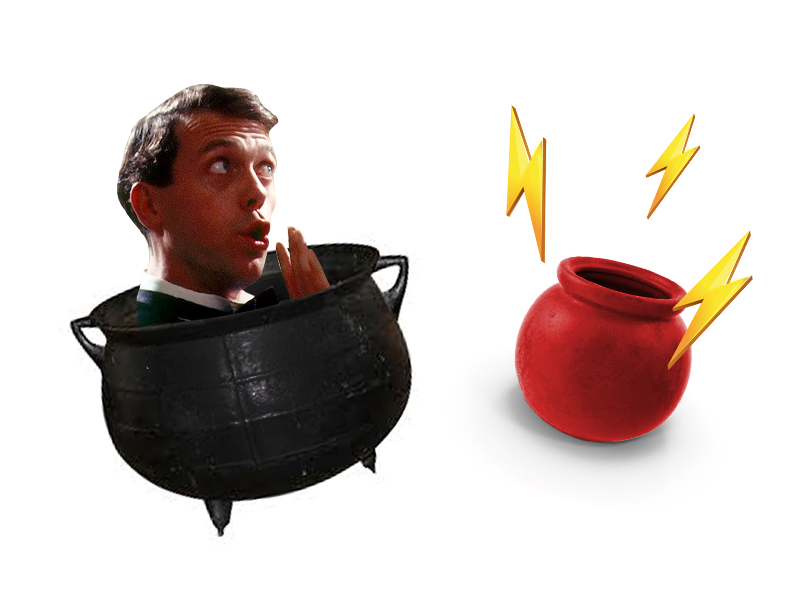
Both game developers accuse each other for ripping their narratives: it’s like the pot calling the kettle black. / Оба разработчика игр обвиняют друг друга в плагиате сюжета, хотя чья бы корова мычала.
A hot potato — Щекотливый вопрос
Буквальный перевод: «горячая картошка».
Это выражение известно с середины XIX века и связано с другим фразеологизмом — «to drop like a hot potato» (стремительно от чего-либо избавиться). Ассоциация возникла на фоне того, как быстро из рук выскальзывает горячая картошка. Так словосочетание «hot potato» стало самостоятельно обозначать что-то не самое приятное, с чем хочется поскорее расправиться.
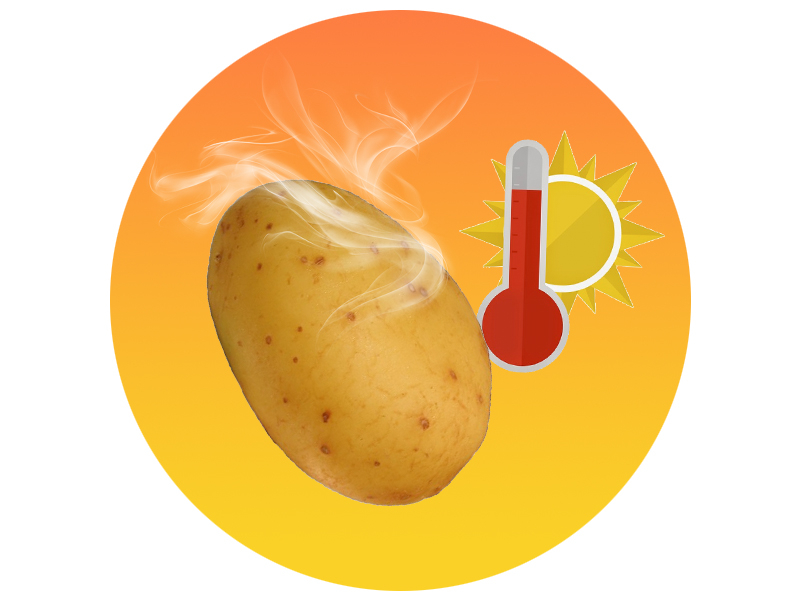
How will this crisis affect cinema production is a hot potato. / Как кризис повлияет на производство кино — щекотливый вопрос.
Cat got your tongue? — Язык проглотил?
Буквальный перевод: «кошка схватила тебя за язык?».
Изначально выражение звучало так: «Has the cat got your tongue?», позже его сократили до «Сat got your tongue». Точное происхождение выражения неизвестно, но есть несколько предположений.
Так, согласно первой версии, выражение пошло от плетки для наказания заключенных, которая по-английски называется «cat o’ nine tails» (буквально это можно перевести как «девятихвостая кошка»). Страх наказания этой плетью заставлял британских преступников держать язык за зубами.
Вторая версия отсылает к средневековой боязни ведьм и их верных спутников — черных котов. Поэтому, когда человек терял дар речи от удивления или шока, такую ситуацию сравнивали с проклятием, которое наложила чародейка явно не без помощи своего кота.

You could be more enthusiastic about the launch! Cat got your tongue? / Мог бы и порадоваться запуску проекта! Ты что, язык проглотил?
Neck of the woods — Трущобы, глушь
Буквальный перевод: «лесная шея».
Эта фраза характерна для американского английского. Впервые она появилась во времена колонистов, но варианты происхождения разнятся. По одной из версий, жители Нового Света старались максимально отстраниться от английских корней и использовали другие слова для обозначения привычных вещей: изначально «шеей» (а вернее, перешейком) называли узкий участок земли, окруженный с двух сторон водой. Американцы начали называть шеей еще и неширокую часть леса или пастбища, а позже и поселение, расположенное в такой местности.
Вторая версия связана с языком коренных американцев алгонкинов: их слово «naiack» означало «место» или «угол». Поселенцы могли перенять это выражение, но со временем его написание и произношение сблизилось с привычным англоязычным жителям Нового Света «neck».

Welcome to my neck of the woods. / Добро пожаловать в мою трущобу.
To go pear-shaped — Пойти наперекосяк
Буквальный перевод: «приобрести форму груши».
Одни лингвисты считают, что это выражение придумали пилоты Королевских военно-воздушных сил Великобритании в 1940-х годах: круги в воздухе — достаточно сложная фигура, поэтому часто вместо окружности у пилотов получалась груша. Другие полагают, что фразеологизм отсылает к Первой мировой войне: запуск воздушных шаров, использовавшихся в то время для наблюдения, шел наперекосяк, когда, надуваясь, они приобретали форму груши.

And when the main cast left, everything with the show went pear-shaped. / А когда основной актерский состав ушел, все в сериале пошло наперекосяк.
Blue in the face — До изнеможения
Буквальный перевод: «синее лицо».
Это выражение часто используется в описании разговоров и дискуссий. Фраза отсылает к ситуации, когда у непрерывно вещающего человека просто заканчивался воздух в легких и его лицо приобретало характерный синий оттенок.
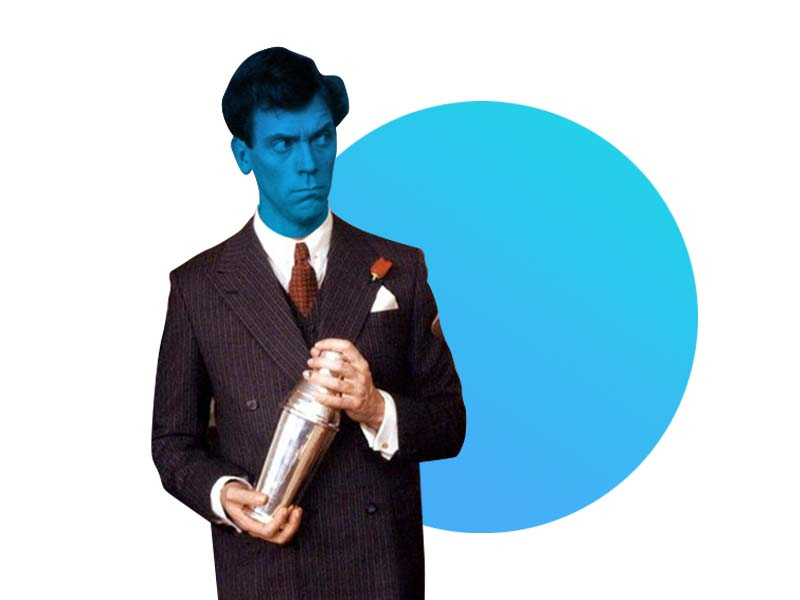
She can talk about the history of feminism till she is blue in the face. / Она может говорить об истории феминизма до посинения.
Thick as thieves — Закадычные друзья
Буквальный перевод: «толстые, как воры».
Идиома появилась в начале XIX века и действительно имеет криминальное прошлое. В то время воры работали в бандах, и успех их планов зависел от уровня доверия внутри группировки, поэтому преступники знали друг о друге абсолютно все. Слово «thick» («толстый»), в данном случае означало «очень близкий», «тесно связанный». Изначально говорили «thick as two thieves», но позже числительное выпало, и получилось сегодняшнее выражение, которое означает близких друзей.
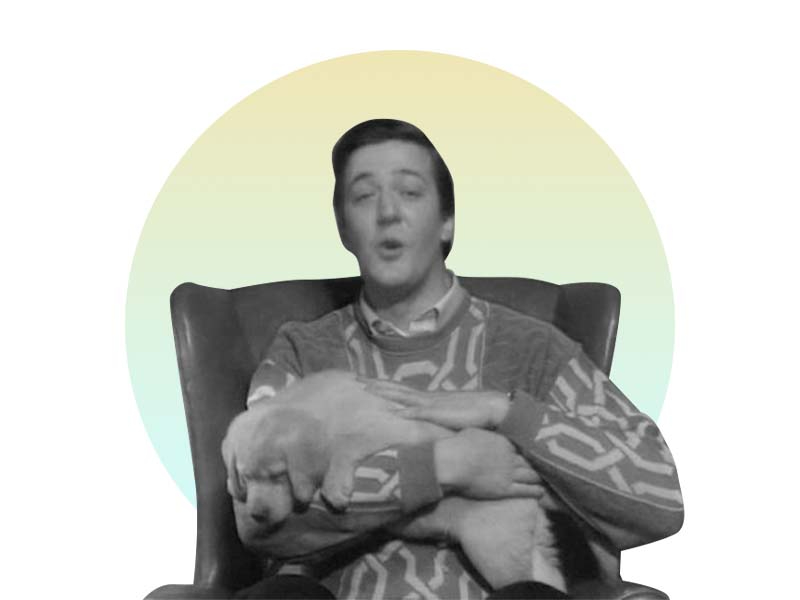
Hopper definitely knows Joyce’s whereabouts but he wouldn’t tell us anything — they are as thick as thieves. / Хоппер точно знает, где находится Джойс, но ничего не скажет: они закадычные друзья.
Wouldn’t touch it with a barge pole — Не приблизился бы и на километр
Буквальный перевод: «не стал бы трогать и баржевой палкой».
В XIX веке, когда многие баржи еще не могли плыть самостоятельно, люди использовали для их передвижения специальные толстые и длинные (около 3 м) палки или сучья. Они позволяли безбоязненно исследовать незнакомый или не очень презентабельный предмет, попадавшийся на пути следования, поэтому выражение стали использовать для обозначения чего-то особенно неприятного или опасного.
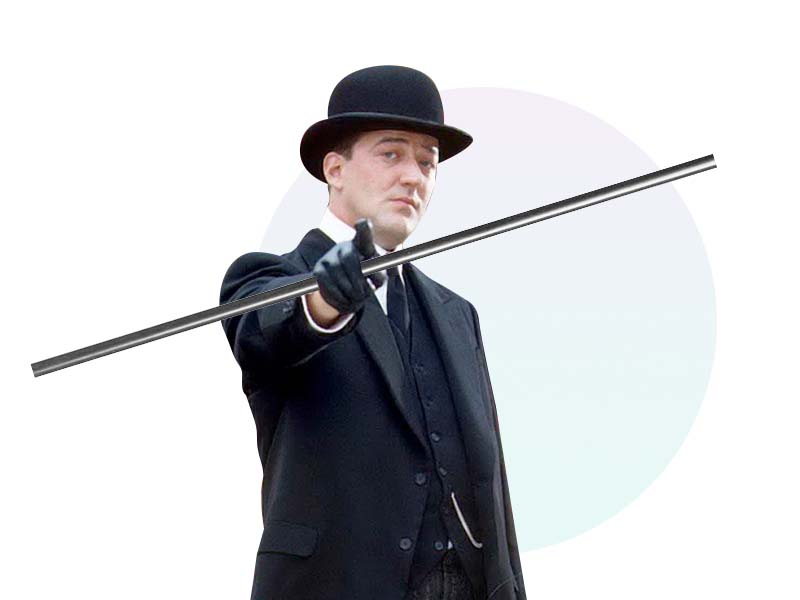
They don’t want any bad publicity, so they wouldn’t touch this influencer with a barge pole. / Им не нужны проблемы с репутацией, так что они и на километр не подойдут к этому блогеру.
Heart in one’s mouth — Сердце в пятки ушло
Буквальный перевод: «сердце во рту».
Считается, что впервые это выражение использовал Гомер в «Илиаде», чтобы передать чувство невероятного нервного напряжения. Древнегреческий поэт обратил внимание на ощущение, которое возникает в моменты страха и волнения: сердце бьется так часто, что вибрация начинает чувствоваться в горле.

When they told me my flight has been postponed, I had my heart in mouth. / Когда мне сказали, что мой рейс отложен, у меня сердце в пятки ушло.
Go bananas — Слететь с катушек
Буквальный перевод: «стать бананом».
Группа Little Big тут ни при чем. Историки и лингвисты полагают, что постарались студенты американских колледжей и обезьяны. Изначально существовал фразеологизм «go ape», который тоже означал сумасшествие и отсылал к образу обезьяны. Устойчивая ассоциация животных с их любимым лакомством в глазах американских студентов стала причиной изменения фразы.

Everybody went bananas when all the fitness clubs in the city opened again. / Все просто с катушек слетели, когда снова открылись все фитнес-клубы города.
Cool as a cucumber — Спокоен как удав
Буквальный перевод: «холодный, как огурец».
Даже в жару огурец обычно на несколько градусов холоднее воздуха — так и появилось сравнение хладнокровного человека, спокойного при любой ситуации, с плодом травянистого растения семейства тыквенных.

The passengers worried about possible speeding ticket, yet Victor was as cool as a cucumber. / Пассажиры переживали из-за возможного штрафа за превышение скорости, а Виктор все равно был спокоен как удав.
Опишите свое состояние одним словом. Игра «РБК Стиль».

